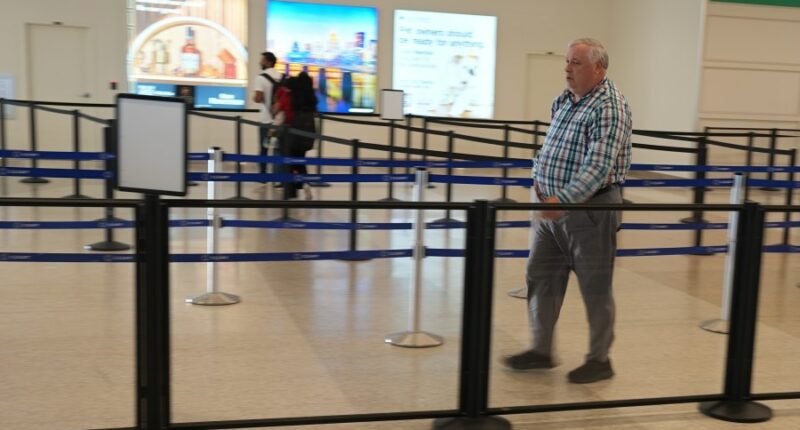Share this @internewscast.com

Starting Friday, air travelers within the United States will face fewer flight choices as the Federal Aviation Administration (FAA) initiates schedule reductions at 40 major airports across the country. This decision aims to alleviate pressure on air traffic controllers, who are grappling with the unprecedented duration of the government shutdown.
The FAA’s head describes this measure as unprecedented but crucial for maintaining passenger safety amidst increasing strains on the workforce. The prolonged shutdown has exacerbated staffing shortages, with air traffic controllers working extensive hours without compensation as political leaders remain deadlocked over reopening the government.
Even prior to the shutdown, many controllers were already stretched thin, working six days a week and clocking in mandatory overtime. Now, they continue these grueling schedules without receiving their paychecks, adding to the stress and operational challenges they face.
According to the FAA’s announcement made on Thursday evening, airports in major cities such as New York, Los Angeles, and Chicago, along with other significant airline hubs, will feel the impact of these cuts. By late Thursday afternoon, hundreds of flights slated for Friday had already been canceled. The situation is expected to escalate, with reductions increasing from 4% initially to 10% by November 14.
Travelers should prepare for potential delays and crowded flights as they head into the weekend and the following weeks.
Here’s what passengers need to know about these cutbacks and how to manage disruptions to their travel plans.
Is my airport on the list?
There’s a good chance it is. The list spans more than two dozen states.
It includes the nation’s busiest airport, Hartsfield–Jackson Atlanta International Airport in Georgia, as well as the main airports in Anchorage, Boston, Denver, Honolulu, Las Vegas, Miami, San Francisco, Salt Lake City, Boston, and Anchorage.
In some metropolitan areas, including New York, Houston, Chicago and Washington, multiple airports will be impacted.
The reductions are between 6 a.m. and 10 p.m. local time and impact all commercial airlines, according to the FAA.
How long will this go on?
It’s hard to say. Even if the shutdown ends soon, the FAA has said it would not lift the flight restrictions until staffing at airport towers and regional air traffic center makes it safe to do so.
“It’s going to take time to work through this,” said Michael Johnson, president of Ensemble Travel, an association of travel agencies in the U.S. and Canada.
That’s why, he said, it’s important to plan ahead — whether you’ve already booked flights or you’re just starting to make holiday travel plans.
Passengers were expected to get notified by airlines on Thursday if their flights are canceled. But it’s a good idea to check your airline’s app or a flight-tracking site for updates before you leave for the airport.
Airlines say they are trying to minimize the impact on their customers, some of whom will see weekend travel plans disrupted with little notice. United Airlines, for example, says it would focus the cuts on its regional routes that use smaller planes.
My flight was canceled. Now what?
“Take a deep breath. Don’t panic,” Johnson said. “There are options available. They may not be ideal, and they may be inconvenient, but you have options.”
If you’re already at the airport, it’s time to get in line to speak to a customer service representative. While you’re waiting, you can also call or go online to connect to the airline’s reservations staff. It can also help to reach out on X because airlines might respond quickly there.
Now might also be the time to consider if it makes sense to travel by train, car or bus instead.
Kyle Potter, executive editor of Thrifty Traveler, said the shutdown is different from when a single airline is having problems and travelers can just pick another carrier. Shortages of air traffic controllers can create problems for entire airports and multiple airlines at once.
“The longer the shutdown drags on, it’s unlikely that there will be one airline running on time if the rest of the them are failing,” Potter said.
Can I get a refund or compensation?
The airlines will be required to issue full refunds, according to the FAA.
But they’re not required to cover secondary costs, such as food and hotel accommodations, unless a delay or cancellation results from a contributing factor that is within the control of the airlines, according to the Department of Transportation.
You can also check the Department of Transportation’s website to see what your airline promises for refunds or other costs if your flight is canceled or delayed.
Should I just stay home for the holidays?
Not necessarily.
You might just need a little more planning and flexibility than usual. A travel adviser can help take some stress off your plate, and travel insurance may give you an extra safety net.
Johnson also warned that flights could sell out fast once the shutdown ends.
“There will be a flurry of booking activity,” he said. “So try to get ahead of it and make sure that you’re protected.”
Other tips
Travel light. Limiting baggage to a carry-on means one less airport line to deal with, and if your plans change unexpectedly, you’ll already have everything with you.
Be nice. Airline agents are likely helping other frustrated travelers, too, and yelling won’t make them more willing to help. Remember, the cancellations aren’t their fault.
“An extra ounce of kindness to yourself and to others at this time of year, with all of the disruptions, will go a long way,” Johnson said.
___
Associated Press journalist Hallie Golden in Seattle contributed.

















